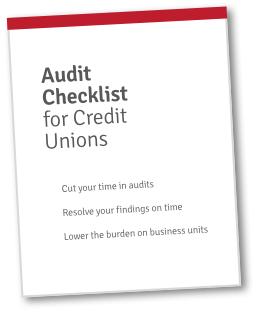We’ve been talking a bit about audit best practices lately. Actually, you could say we’ve been talking about audit worst practices, but the two almost go hand in hand. It’s all about how you can better approach your audits and exams so you can stay out of trouble.
So, in that vein, we’d like to offer one more. We’d like to suggest one thing to make your audit life a little easier. It’s one thing that you should never forget:
And it’s about your auditor.
Auditors Are Credit Union Audit Resources
There’s a little habit in our industry. That habit is to look at auditors and examiners in a slightly adversarial light. It shouldn’t be that way.
But it’s understandable. They’re the people who watch over our backs and make sure we don’t make any egregious mistakes. Sure, that’s all well and good, but the trick is that nobody likes having someone look over their shoulder like that. Not literally, and not figuratively either.
But a little scrutiny is okay. It’s annoying. It’s stressful. But it doesn’t actually hurt.
Know what does hurt?
Failing to meet regulations and suffering through a drawn-out remediation process. That hurts. Or not meeting compliance and dealing with the regulatory action of the NCUA. That hurts. Or not maintaining proper liquidity and then getting in a bad position. That really hurts!
So foremostly, it’s important to remember that a little oversight is probably for the best.
Auditors Are Your Friends
Okay, perhaps “friend” is a bold claim. They’re work acquaintances. But they’re acquaintances who help.
Whether they be internal or external auditors, their job is to ensure the smooth and legal operation of your credit union. And, though some may be loathe to admit it, most of them have a very, very strong understanding of how we should be doing our jobs.
Nobody likes to be told how to do their jobs, but sometimes it’s necessary. Similarly, few people like doing tedious work, double-checking things they’ve already double-checked, or trudging through clerical or administrative tasks like documentation.
But some people do like doing those things, and those people are your auditors. And it’s a good thing they exist, because without them, you might get sorely off track and not even realize it.
So, just remember that your auditors have chosen their profession not to spite to, but to help you. They want to help you reach your goals of making your members’ lives better and their money safer. They want to help you be your best self.
How to Use Your Auditors as Audit Resources
Auditors make great audit resources. They don’t always make it easy though:
They may find information that makes you and your credit union uncomfortable. They may seem to draw things out longer than you want them to go. The process might get exhausting or painful at times.
But those are growing pains!
So, at the risk of repeating what we’ve said a few times before, here’s how to use your auditors as audit resources:
Be communicative! Make sure you maintain open, frequent lines of communication. Your auditor can’t answer questions or clarify needs if you never begin those conversations.
Be proactive! Don’t wait until an issue gets insurmountable before you approach your auditor. If something looks like it might be an issue, address it as soon as possible.
Be friendly! Your auditors can help you navigate the tricky regulatory waters if you get muddled. They can give you the direction that you need.

FREE: Audit Checklist for Credit Unions
4 key principles and 9 questions to jumpstart your audit planning. From leading credit unions.Further Reading
We know—for some credit unions, auditors are the boogiemen. Audits inspire low-key dread. But in the end, audits are useful, and auditors are just the people who are tasked with ensuring the long-term success and resiliency of your credit union.
You’re better off working with them than independently of them.
Subscribe to our blog to stay up to date on compliance news and resources for audit process improvements. Or follow the links below to see what else we’ve written about lately.




